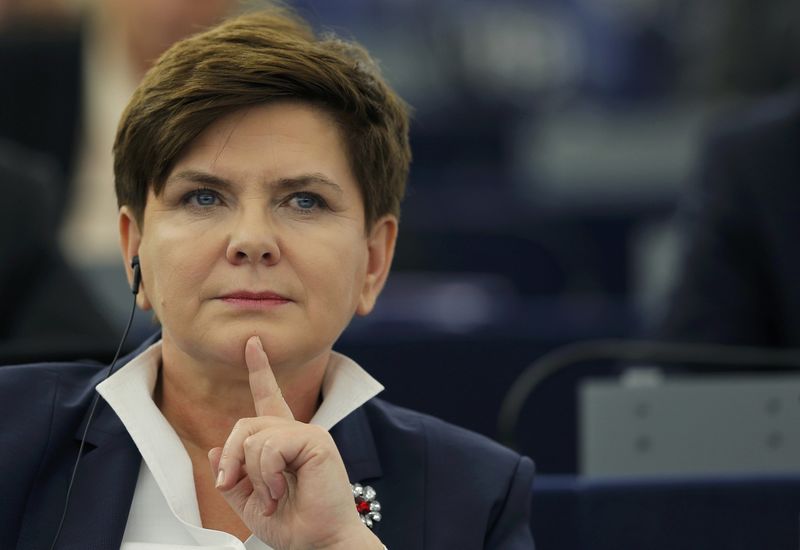By Gabriela Baczynska
STRASBOURG, France (Reuters) - Polish Prime Minister Beata Szydlo told European Union lawmakers on Tuesday that her government had not breached European or Polish laws after the bloc launched an investigation into charges that Warsaw was undermining democratic principles.
After bitter exchanges between Polish and EU officials, the EU's executive asked Warsaw to explain laws that have all but paralysed the work of the top constitutional court and put public media under direct government control.
Both Warsaw and Brussels have since sought to tone down the rhetoric and Szydlo, speaking in a European Parliament debate on Poland, declared that Poles were firmly part of Europe.
"There have been no violations of the constitution in Poland recently," Szydlo said. "The Constitutional Tribunal is doing fine in Poland these days. It works. Nothing bad is going on."
"We are part of a united Europe, this is a major value for us. We are Europeans and we are proud of it."
Critics of her government, which came to power last year advocating a bigger state role in the economy, conservative values and Euro-scepticism, accuse Szydlo of a power grab. Warsaw says it has a strong political mandate for the changes.
Szydlo on Tuesday said the changes to the constitutional court were an internal matter for Poland, while moves relating to public TV and radio were in fact aimed at promoting a larger pluralism of views on air.
"We have never sought to dominate the tribunal ... The dispute around it is a political, not a legal one. It's a political dispute and an internal Polish dispute. Poland should solve it on its own," Szydlo said.
She also said her government would not change course and expressed dismay that Poland was the first country to be investigated under the rule of law monitoring procedure, established in 2014 in the aftermath of similar concerns the EU had about Hungary.
"Today I can have a sense of injustice that it is Poland that is subjected to this experiment," she said. "The Polish government will not give up the programme which it promised to its voters. We will implement the programme awaited by Poles."
The European Commission's First Vice-President Frans Timmermans said the probe into Poland would focus on the changes to the constitutional tribunal, a body tasked with assessing whether laws are in line with the constitution.
The Commission's objections focus on the failure of Poland's president, elected with the backing of the ruling Law and Justice party, to swear in three judges of the tribunal who had been chosen by the previous parliament.
Further concerns relate to the raising of the number of judges who have to try cases, imposing an obligation to hear cases in the order they are received, which could effectively paralyse the court's work.
"This has given rise to uncertainty regarding the functioning of the Constitutional Tribunal. Given the central position of the Constitutional Tribunal within the Polish judicial system, we risk seeing the emergence of a systemic threat to the rule of law," Timmermans said.
"When national rule of law safeguards seem to come under threat, the EU needs to act," he said.
The Commission probe could eventually lead to the suspension of Poland's voting rights in the 28-nation bloc if the Commission decides that Warsaw has not observed the rule of law.
